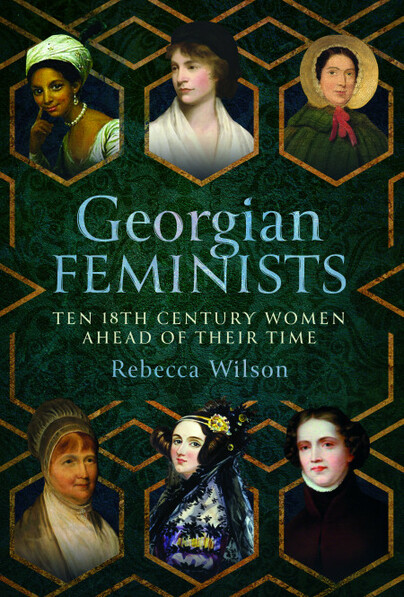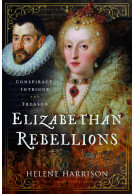Georgian Feminists (ePub)
Ten 18th Century Women Ahead of their Time
Imprint: Pen & Sword History
File Size: 3.4 MB (.epub)
ISBN: 9781399069274
Published: 10th March 2025
| Other formats available | Price |
|---|---|
| Georgian Feminists Hardback Add to Basket | £20.00 |
For centuries women’s history has been dismissed, or ignored entirely. Women make up half of society, and yet few pages have been written about women’s history, their lives, and contributions. It is time to redress this imbalance and recognize the significant involvement and impact women have had throughout history.
Enter the Georgian period, hailed as the Age of Enlightenment. Amidst a backdrop of cultural blossoming, intellectual fervour, and the whirlwind of the Industrial Revolution, society underwent seismic shifts politically, socially, and technologically. However, for women, the landscape remained largely unchanged; the expectations of domesticity, marriage, and motherhood persisted as steadfast norms.
Embarking on a journey through diverse backgrounds, from aristocracy to enslavement, this book introduces ten remarkable women who defied societal norms during the Georgian period. Among them are political activists, social reformers, a literary luminary, a pioneer in palaeontology, and a mathematical prodigy. These trailblazers dared to pursue careers, passions, and lifestyles deemed scandalous by societal standards, challenging the status quo and carving out paths of empowerment in a world reluctant to grant them their due recognition. Each embodies the spirit of feminism, resisting the grip of patriarchy and leaving an indelible mark on history.
Rating: 5 out of 5 stars
NetGalley, Georgi Lvs Books
‘For the most part, the role of a woman remained much as it had done for centuries. Girls were brought up with the sole purpose of finding a husband, ideally one of good standing and with money.’
I adore Rebecca’s work. This was such a fascinating read and my love for Georgian history has just grown so much more after reading this.
Every woman was inspiring to read about.
A must read for anyone who enjoys history and woman’s history.
‘Her strength to leave that marriage and her determination to contact her children made her stand out from the many married mothers in this country. She went to such lengths to make her children feel loved.’
Rebecca has also written Tudor Feminists and her next book is Victorian Feminists which isn’t released until 2026 but I am EXCITED!!!!
The introduction to Georgian Feminists is an impressive weaving together of the underlying philosophy and social context which impacted the individual lives of the ten women who feature in this book. Rebecca Wilson has adopted an accessible style without neglecting a scholarly approach to ensuring that the women’s stories are seen as the outcome of the ideological foundations impacting the period. Wilson frames the women’s lives and their rebellion in the society that depicted them as inferior, worthy of little respect or economic independence and the chattels on whom men might rely, but unworthy of credit or even acknowledgement. She returns to this approach throughout the book, making it a worthy intellectual endeavour as well as promoting easily absorbed information.
NetGalley, Robin Joyce
The ten women, some well-known, others about whom little has been recorded are well chosen. Sarah Pennington is followed by more familiar figures such as Mary Wollstonecraft, Jane Austen, Elizabeth Fry and Ada Lovelace. Dido Elizabeth Belle, Hester Stanhope, Mary Fildes, Ann Lister, and Mary Anning round out the group so that the themes that might be familiar from other authorities and Wilson’s work on familiar characters can be applied readily to new stories and actors.
Wilson raises new viewpoints about known women, for example, she questions the way in which Austen’s work has usually been considered. Importantly, she brings to her accessible work the understandings found in heavier academic texts where feminist re-readings have raised new ideas about Austen’s approach to women’s position, particularly as it relates to marriage. This approach brings a freshness to stories considered known, making such a valuable contribution to women’s history. At the same time, the introduction of less well-known women’s history rounds out the book.
Demonstrating her independent approach to women’s role throughout history, Wilson begins by acknowledging that some women have always been independent of the social mores that determined their existence. This is a well-considered beginning, accepting as it does, that no century has been without its women of note, and fortunately some of their activity has been recorded. Not enough about particular women, and not about enough women in general, it is true. However, Wilson’s support for recognising that women’s independent thought and activity is not confined to ‘waves’ as some writers suggest provides an important foundation to her work. Some women have always moved beyond the confines of their sex, and Wilson is introducing some, adding more information to others, and, most importantly, producing a book that is readily accessible.
There are notes, an index and a bibliography. Examples from the latter provide an important part of the main text, Wilson often discussing the findings in relation to her own interpretations of events, characters, and behaviour. Again, this points to the work as one which makes an accessible and valuable contribution to recognising individual women’s activities as well as providing a social and scholarly context in which to view them. Overall, this is a very satisfying read indeed.
Georgian Feminists is a must read for anyone who is an avid history buff. It digs deep into the forgotten lives of Georgian women, their struggles, their hopes, and how they tried to change the world not only for themselves but for their descendants. I couldn't put this down. As a history buff, I found the story enthralling and intriguing.
NetGalley, Katherine McCrea
About Rebecca Wilson
Rebecca Wilson has a bachelors’ degree in history and English literature; after gaining her PGCE she taught English and history for several years. She now writes for The Historians Magazine on a range of historical periods and gets involved in archaeological digs when the opportunity arises. Rebecca is part of a group of volunteers who raise funds and awareness for the Egremont Castle, a beautiful medieval ruin. She has been a guest speaker on Talking Tudors and speaks passionately on the dissolution of the monasteries and the life and work of William Skaespeare. This is her first book.
















